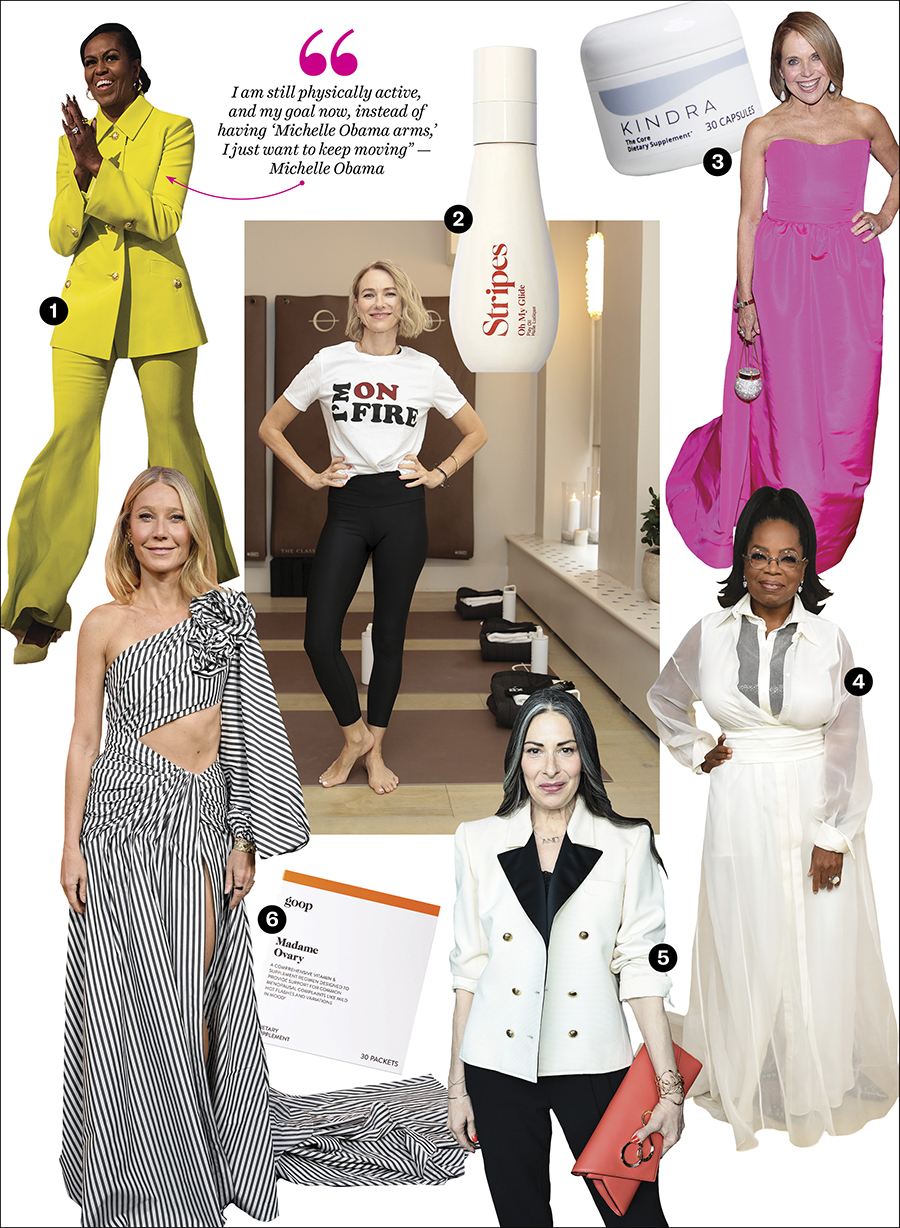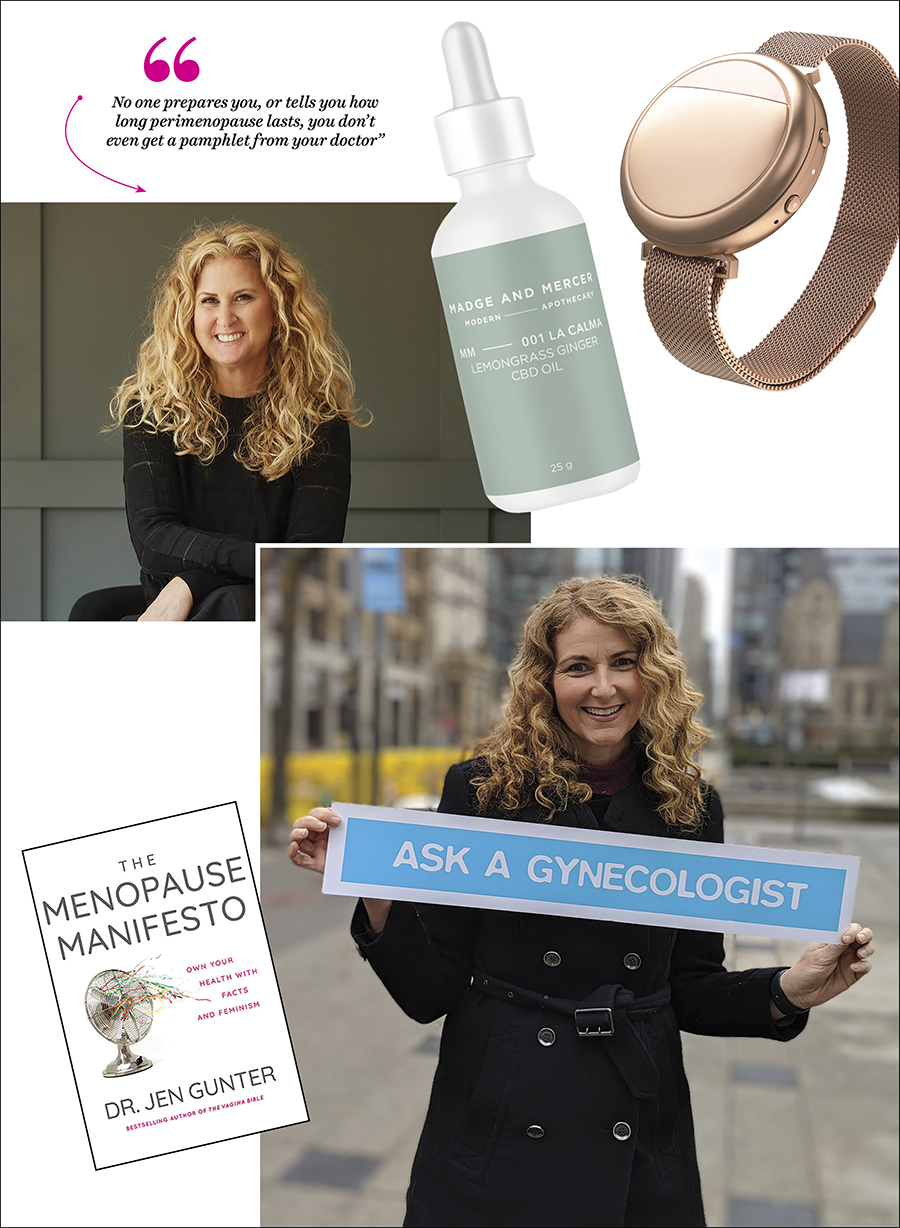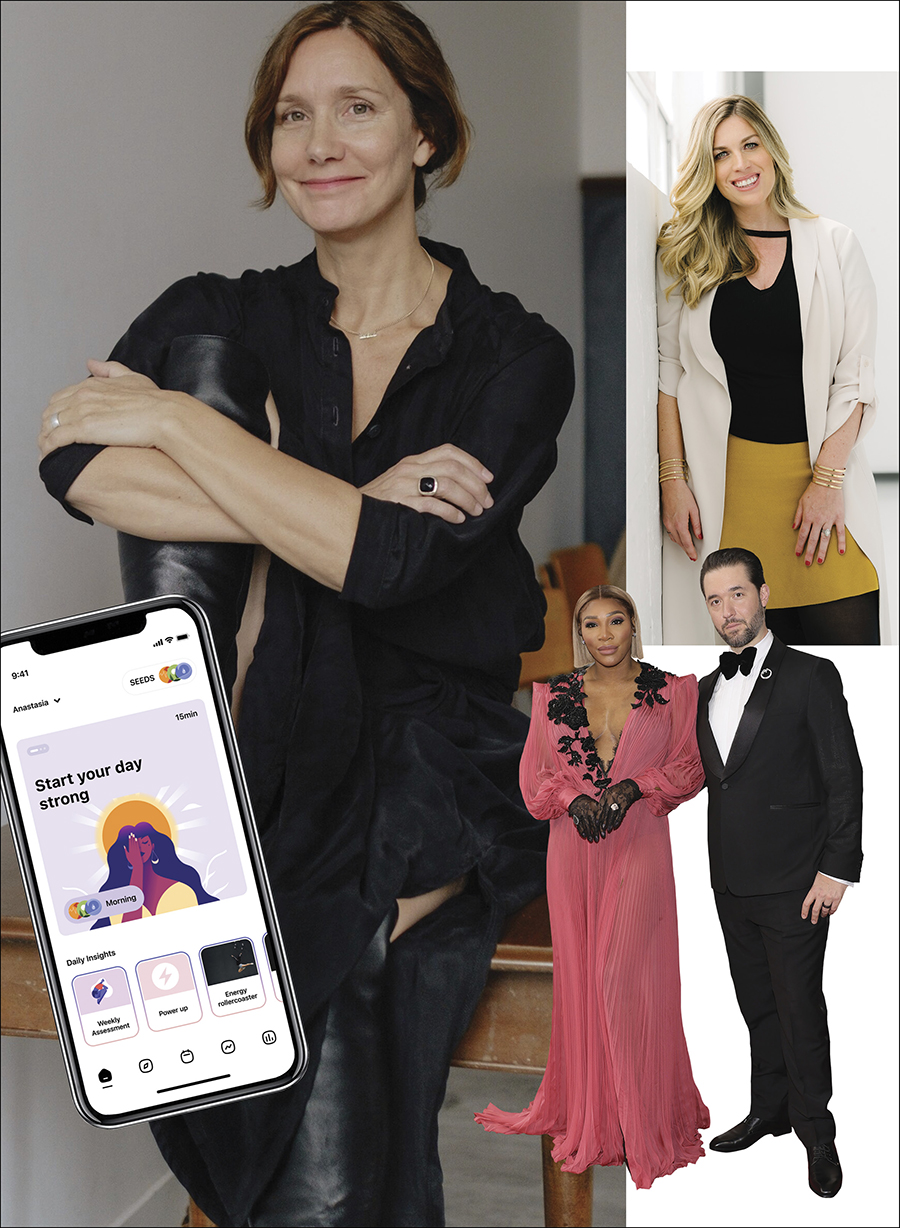The Change: Rebranding Menopause Into a Multibillion-Dollar Business

Actress Naomi Watts launched Stripes — a wellness product line for women in perimenopause and menopause — last October. Photo: Dimitrios Kambouris/Getty Images for Stripes/Amyris
Once a taboo subject, the rebranding of menopause has created a multibillion-dollar business thanks to a flood of new products and celebrity endorsements.
No woman on Earth needed Gwyneth Paltrow to tell her “menopause could use a bit of rebranding,” but since the 50-year-old lifestyle guru made that prescient comment in 2018, it’s become clear the marketplace needed to hear it. Five years later, menopause is an industry unto itself, with A-list celebrities opening up, speaking out and cashing in with brand endorsements and products like Paltrow’s own cheekily named Madame Ovary, an oral supplement “for common menopausal complaints.”
Indeed, the financial news website BNN Bloomberg reports the global market for menopausal products “is growing rapidly, at a rate of more than five per cent,” having already hit US$15 billion in 2021. For a subject that’s usually talked about sotto voce, if at all, this is a stunning social evolution — or is it a revolution? Either way, menopause is having a moment.
It’s about time, if you consider the statistics. Half the world’s population is female, and by 2025, more than one billion women will be heading into menopause. In Canada, a country of 38 million, about five million women are dealing with its multiple symptoms right now. And yet, a national study commissioned by the Menopause Foundation of Canada (MFOC) in 2022 – aptly titled The Silence and the Stigma – reported that one in two women feels unprepared for this stage of life and more than half believe menopause is still a taboo subject.

In 2023, however, “the change” is bringing on, well, change. Leading the way are gen-X women who, unlike their mothers and older sisters, aren’t willing to suffer in silence — or ignorance. “There’s a lot of anger among women my age. We feel let down by the medical community,” says Christina Valentine, 53, a mother of three who lives in downtown Toronto. “Women aren’t accepting the lack of guidance and treatment for perimenopausal symptoms anymore and they’re acting on it.”
Remarkably, many women hit this life stage without a handle on the basics: Perimenopause, which can take from two to 10 years, is the transition out of the reproductive years, when estrogen levels start plummeting; menopause is defined by the absence of a period for 12 consecutive months. The whole process can begin in your 40s and end in your mid-50s, and throughout, it’s possible to experience more than 30 symptoms, hot flashes being the best known, but not necessarily the worst.
The Menopause Foundation of Canada study also found that 72 per cent of the 1,023 women aged 40 to 60 surveyed felt their doctors were unhelpful or only somewhat helpful and 38 per cent felt under-treated, so it stands to reason that this current, less hung-up generation of women now entering perimenopause would seek advice elsewhere. Filling the void are functional doctors — physicians who treat the body holistically, looking for the root cause of illness; integrative doctors who pair conventional medicine with alternative therapies; practitioners of traditional Chinese medicine, naturopaths and dietitians. And then there are the products, many of them A-list-branded-and-promoted.
Last October, 54-year-old actress Naomi Watts launched Stripes, a wellness product line for women in perimenopause and menopause. American TV personality Stacy London, 53, who famously used to tell viewers What Not to Wear, co-founded State of Menopause and has branded herself as a menopause advocate and influencer. Author and comedian Jill Kargman hosted a menopause symposium for the Swell, an online members-only community for those 40 and over. Kate Couric Media has invested in Kindra, which makes “estrogen-free menopause essentials.” Los Angeles-based tech company Embr Labs sells the Wave2, cooling wristband for hot-flash relief ( U.S. $299). And while promoting her new book The Light We Carry (2022) Michelle Obama, 59, talked about her experience with menopause, describing her weight gain as a “slow creep” and telling People magazine how her workouts have changed. “I am still physically active, and my goal now, instead of having ‘Michelle Obama arms,’ I just want to keep moving.”
There’s no shortage of cleverly named natural products on the market — Vag of Honor, me-NO-Pause and Tranq Dranq — but this is where the rebranding of menopause becomes tricky. The MFOC’s president and co-founder, Janet Ko says it’s a positive thing when celebrities use their platforms to change the conversation on aging, but spreading misinformation is not. “The challenge is the promotion of products that promise symptom relief but have no data to back their claims.” She points to the North American Menopause Society guidelines that encourage women to seek only evidence-based solutions, grounded in science. So, with this recent upsurge in celebrity-generated exposure of menopause, you have to wonder if their voices diminish the stigma or simply add to the noise.
Noise would no doubt be Dr. Jen Gunter’s reply. The outspoken Canadian ob-gyn and author of 2021’s The Menopause Manifesto, says natural products are based on junk science. She has publicly sparred with Paltrow about the legitimacy of supplements sold on her online platform, goop.com, and what should or should not be inserted into the vagina. On Jensplaining, Gunter’s CBC docuseries, she says: “There’s no need — the vagina is like a self-cleaning oven.” But Gunter, while vociferous and committed, would need to quit her day job to fight in earnest the rising tide of alternative treatments.

Celebrities are doing something right when they use their profiles to amplify the menopause narrative. “No one prepares you, or tells you how long perimenopause lasts; you don’t even get a pamphlet from your doctor,” says Shauna Levy, 54, founder of Canadian brand Madge and Mercer Modern Apothecary. Her brand of cannabis-based wellness products are for women over 40 who, she says, are comfortable with digital conversations and motivated to get past the taboo. “Social media feels like a safe space to discuss topics like menopause that were previously not discussed.” And not coincidentally, that’s where celebrities with product lines are also active.
But if you happen to be between the ages of 60 and 70, you might be asking yourself why you were left on a desert island of menopause with little to no help — and certainly no hormone replacement therapy (HRT). You can blame that on a 2002 study by the U.S.-based Women’s Health Initiative (WHI), which erroneously linked hormone replacement therapy with breast cancer. By 2019, the study’s findings were discredited, and HRT was no longer demonized. Now it’s regularly prescribed, but the WHI study held back progress in the field of women’s health care by a decade, according to Dr. Wendy Wolfman, director of the Menopause Clinic at Toronto’s Mount Sinai Hospital and a professor in the Department of Obstetrics and Gynaecology at the University of Toronto. After the WHI study hit, “doctors didn’t go into this area of medicine,” says Wolfman.
With HRT struck from the list of treatment options, there seemed to be little else your family doctor could do for you. Turning to Google, you’d be encouraged to “wear natural fibres” and “sleep in a cool room.” As Wolfman sees it, until recently the study of menopause simply hasn’t been respected in the medical community or at medical schools, in part due to society’s “lack of appreciation” for aging women — thus the dearth of training, research funding and general knowledge.
Not even Oprah escaped the menopause knowledge gap. In 2019, while in her mid-60s, she started having heart palpitations. She consulted five different doctors and went so far as to go on heart medication before her issue was correctly diagnosed: perimenopause. “We looked for the most dire explanation instead of the most likely,” Oprah wrote in O magazine.
The fact that heart palpitations are now recognized to be a symptom of menopause (along with dry eyes, urinary tract infections and brain fog, to name just a few) should indicate that menopause is finally getting some respect. Wolfman says that discoveries in the last years have helped. “Now we know that every time a woman has a hot flash, it’s a huge vascular event,” she says. That alone has “lent medical validation” to a symptom that, to most women, is just a pain in the ass.
The workplace is where the rebranding of menopause could have serious economic benefits, given that five million women over 40 are part of Canada’s 19-million-person labour force. As it stands, menopausal women in Canada are unsupported by their employers and often feel discriminated against based on age, which makes normalizing menopause a health equity issue, too.
Maybe technology will help. That’s where investors are focusing their interests in the menopause marketplace. Alexis Ohanian, 39, who co-founded the social media platform Reddit and is married to tennis star Serena Williams, 41, raised seed funding for Elektra Health, a new women’s health tech company working in partnership with world-renowned physicians. Its mission is “to smash the menopause taboo” and bring it into the 21st century.

The51, a women-focused Canadian venture capital firm, is also setting its sights on digital platforms in the femtech space, including menopause. Co-founder Shelley Kuipers offers two examples of such start-ups: Khyria, the first all-in-one health toolkit for women in midlife and menopause, and Herstasis Health, a platform for women in the menopausal transition to manage debilitating symptoms and improve their quality of life.
But when it comes to rebranding taboo topics associated with women’s bodies, the Canadian success story is Knix, the pioneer of leakproof underwear that looks like regular underwear but acts like a replacement for pads. By positioning Knix as “underwear for everyone,” the brand offers an all-in-one solution for women at all stages of life, from period mishaps to post-menopausal leaks. Founder Joanna Griffiths — who recently sold an 80 per cent stake in Knix to Swedish health and hygiene company Essity for US$320 million — says marketing to menopausal women is the next natural evolution of the brand.
In the end, Wolfman’s objective of improving women’s quality of life as they age seems in sync with celebrities shilling menopause-focused brands, opportunistically or not. Profits aside, if menopause — a life stage as inevitable as puberty and death for every female on the planet — were to be destigmatized, everybody wins.
A version this article appeared in the Feb/Mar 2023 issue with the headline ‘The Change,’ p. 62.
RELATED:
Menopause Can Affect Every Workplace – Here’s How to Start Supporting Every Worker Experiencing It